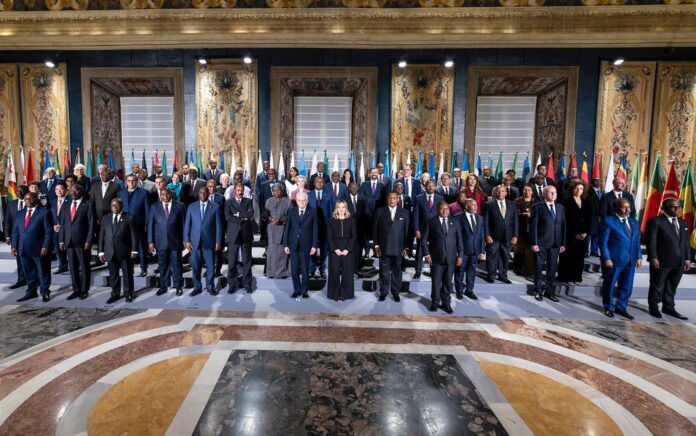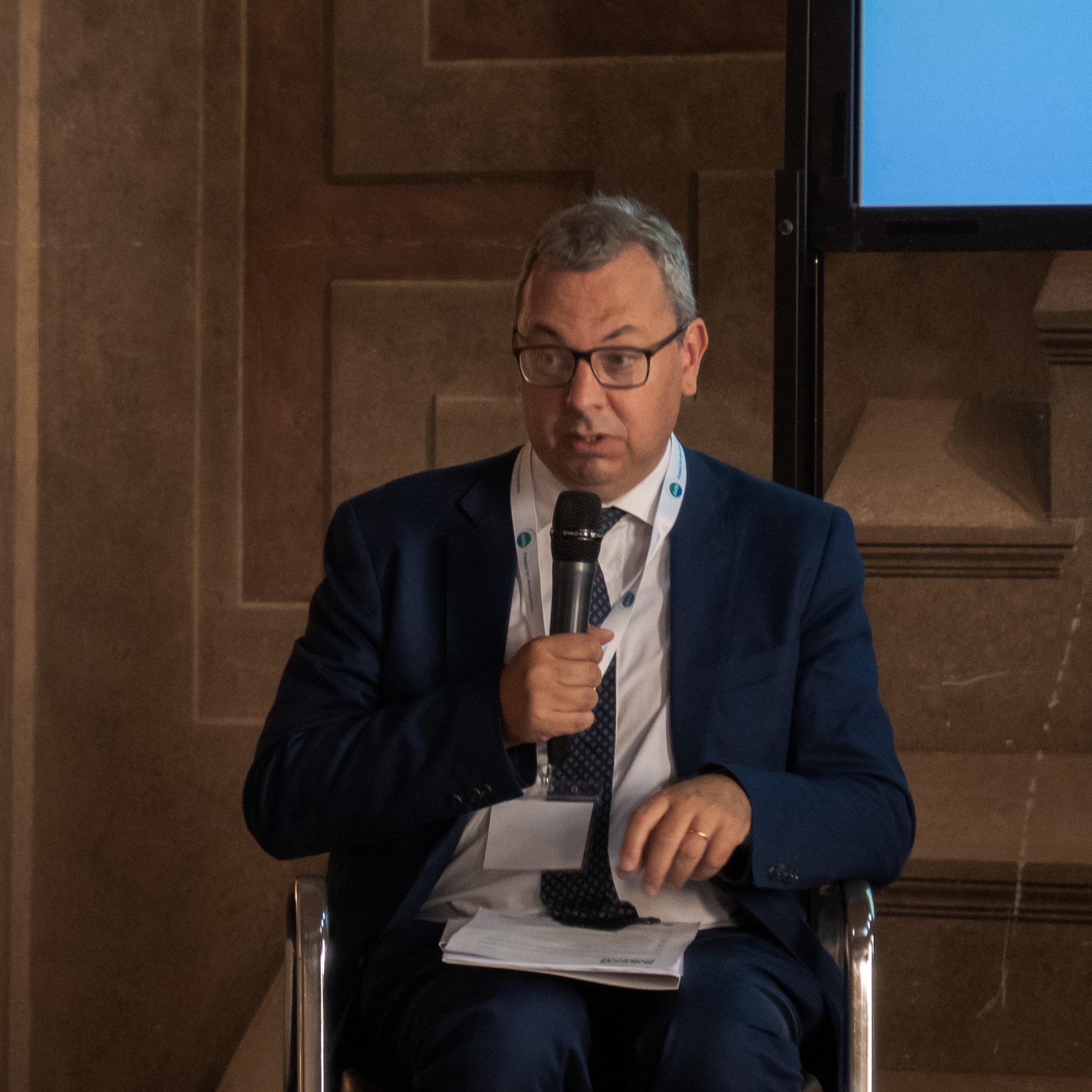On January 1, 2024, Italy assumed, for the seventh time, the Presidency of the G7: the group that brings together Italy, Canada, France, Germany, Japan, the United Kingdom, and the United States of America. The G7, in which the European Union also participates, is united by common values and principles and plays an invaluable role in defending freedom and democracy and addressing global challenges.
The Italian Presidency will last until December 31, 2024, and will feature a dense programme of technical meetings and institutional events throughout the country. The main event, the Leaders’ Summit, will be held on June 13-15 in Apulia.The Italy-Africa Summit was the first international event to be held in Italy since the beginning of its G7 Presidency, attesting to the importance Italy attributes to its partnership with African Countries. This is, in fact, the first time that the Italy-Africa Conference is being held as a Summit of Heads of State and Government, having been held only at ministerial level until now. In attendance were numerous Heads of State and Government and Ministers of African Countries, together with representatives of the African Union and European Union. The main international organisations also participated, starting with the UN, international financial institutions and multilateral development banks.
The five pillars of the Mattei Plan - The plan is named after Enrico Mattei, an Italian public administrator who, in the 1950s, advocated for Italy to support North African governments grow their economies and develop their natural resources. Seventy years on, Meloni is showcasing the Mattei plan as the crown jewel of her foreign policy, aiming to once again renew Italy’s approach to the African continent.- Education and training
- Agriculture: measures will aim to reduce malnutrition rates, foster the development of agri-food chains and support the development of non-fossil biofuels. In this context, it is deemed fundamental to develop family farming, preserve forest heritage and fight and adapt to climate change through integrated agriculture
- Health
- Energy: the strategic goal is to make Italy an energy hub, a real bridge between Europe and Africa. Measures will centre around the climate-energy nexus, focusing on boosting energy efficiency and the use of renewable energy, with actions aimed at speeding up the transition of electrical systems, in particular for electricity generation from renewable sources and transmission and distribution infrastructure. The plan also provides for the development of energy-related technologies in the countries themselves, also by setting up innovation centres, where Italian companies will be able to select local start-ups and thus support employment and the enhancement of human capital.
- Water: measures will regard the drilling of wells, powered by photovoltaic systems; maintenance of existing water points; investments in distribution networks; and, awareness-raising activities on the use of clean, drinkable water
Context:
The purpose of the conference was to present Italy’s strategic plan that aims to review the country’s approach to the African continent.
Italian premiere, Giorgia Meloni, unveiled a “non-predatory” approach aimed at fostering cooperation. Though critics argue that the plan, dubbed “Mattei Plan”, after Enrico Mattei, an Italian public administrator who, in the 1950s, advocated for Italy to support North African governments to grow their economies and develop their natural resources. Seventy years on, Meloni is showcasing the Mattei plan as the crown jewel of her foreign policy, aiming to once again renew Italy’s approach to the African continent. As things stand, however, the plan is far from comprehensive.
The plan is due to cost around 3 million euros a year and has a four-year duration. The goal is to enhance energy cooperation with African countries and help them in different areas including health, education, and other several other sectors, but its main purpose is to address the root economic causes of mass migration from Africa. Some critics have argued it lacks a clear strategy.
“We have all been waiting to find out more about the content of the plan. But as clarified by a government’s decree, the strategy will be outlined starting from this conference and in the weeks to come. We’d like the action plan to mainly focus on Africa’s needs and the needs of the states and the countries’civil societies. We’d also like to see the use of a “bottom up approach” meaning that nothing is being imposed from above. One positive aspect of the “Mattei plan” is its long-term vision – in other words we are not dealing with the single emergency like in the case of migrant arrivals but rather we are talking about a long term strategy,” Giampaolo Silvestri, Secretary General of the Fondazione AVSI.
Programme:
Plenary session:
- President of the Council of Ministers, Giorgia Meloni
- Vice-President of the Council of Ministers and Minister of Foreign Affairs and International Cooperation, Antonio Tajani
- Chairperson of the African Union, Azali Assoumani
- Chairperson of the African Union Commission, Moussa Faki Mahamat
- President of the European Parliament, Roberta Metsola
- President of the European Council, Charles Michel
- President of the European Commission Ursula von der Leyen
- Deputy Secretary-General of the United Nations, Amina Mohammed
"Today, only 2% of global investments in clean energy go to Africa. This is very sobering given Africa's immense potential as a clean energy powerhouse. Africa has the space, the wind, the sun, just to name a few. What it lacks is infrastructure. But together we can change this. With Global Gateway, we aim to bring clean energy to 100 million people who currently do not have access to energy. This can turn out as a double win. Africa can not only produce enough clean energy to power up the African continent but also to create revenues by exporting. Preparations have begun, for example, to build the first underwater electricity cable linking North Africa to Italy and the rest of Europe. And for example, our new Hydrogen Bank is now open to African producers. This means good jobs, energy and energy security for both Africa and Europe. (...) Over 50 Italian universities now have exchange programmes with their African counterparts. The University of Parma, for example, coordinates an Erasmus project to develop clean energy skills in Africa We want to invest in this kind of cooperation. Ursula von der Leyen
- Session I: ECONOMIC AND INFRASTRUCTURAL COOPERATION Introduction speeches by: Vice-President of the Council of Ministers and Minister of Infrastructure and Transport, Matteo Salvini; Minister of Economy and Finance, Giancarlo Giorgetti; Minister of Enterprises and Made in Italy, Adolfo Urso
- Session II: FOOD SECURITY Introduction speeches by: Vice-President of the Council of Ministers and Minister of Foreign Affairs and International Cooperation, Antonio Tajani; Minister of Agriculture, Food Sovereignty and Forestry, Francesco Lollobrigida Participants' speeches
- Session III: ENERGY SECURITY AND TRANSITION Introduction speech by: Minister of the Environment and Energy Security, Gilberto Pichetto Fratin Participants' speeches
- Session IV: VOCATIONAL TRAINING AND CULTURE Introduction speeches by: Minister of Education and Merit, Giuseppe Valditara; Minister of University and Research, Anna Maria Bernini; Minister of Culture, Gennaro Sangiuliano Participants' speeches
- Session V: MIGRATION MOBILITY AND SECURITY ISSUES Introduction speeches by: Minister of the Interior, Matteo Piantedosi; Minister of Defence, Guido Crosetto
- Paolo Ciampolini (from the University of Parma) is currently the European Coordinator of in the framework of ERASMUS+/Capacity Building for Higher Education program. The project will be implemented under four Rwandan Institutions: INES-Ruhengeri, Rwanda Polytechnic, the University of Technology and Arts of Byumba (UTAB) and the University of Rwanda (UR).
- It will be also implemented under the European ones: University of Parma (Italy), National Research Council (Italy), Hochschule Niederrhein (Germany) and Hochshule Bonn Rhein-Sieg (Germany). See also: EU GREEN - Shaping our Alliance].
While energy "may be the most relevant part" of the Mattei Plan, "Meloni is investing political capital in it mostly because of migration" Giovanni Carbone, head of the Africa Programme at the Institute for International Political Studies (ISPI) in Milan.
Further resources
- Italia-Africa. A bridge for common growth [VIDEO]
- Italia-Africa. A bridge for common growth [PHOTO]
- Translation of President Meloni's opening address
Related
Just before meeting with the Italian prime minister, Adesina AFDB gave a rousing speech to the General Assembly of the Association for the Development of Italian Companies in Africa, the Mediterranean and the Middle East—the Confindustria Assafrica & Mediterraneo.
The number of fintech startups has tripled, reaching 5,200 between 2020 and 2021 alone. It is projected that revenues of fintech companies could reach over $30 billion by 2025. Google and the International Finance Corporation estimate that Africa’s internet economy alone could reach $180 billion by 2025 and rise further to $712 billion by 2050.
The African Development Bank is investing $20 billion for the Desert-to-Power program, to build 10,000 megawatts of solar power across 11 countries in Africa and provide electricity for 250 million people.
To unlock this potential the African Development Bank has so far invested $12 billion in agriculture over the past 6 years. The Feed Africa Summit held in Dakar last year by the African Development Bank, Government of Senegal and the African Union, has also mobilized $72 billion for investments in unlocking Africa’s agricultural potential.
Africa and Europe are significant trading partners. Exports from Africa to the European Union totaled $203 billion in 2022, while imports from Europe into Africa was $174 billion. This is a significant advantage for Italian firms looking to do business in Africa. Foreign direct investment from Italy to Africa reached $30 billion in 2022. However, this represents only 5% of Italy’s total foreign direct investment globally.




No comments:
Post a Comment